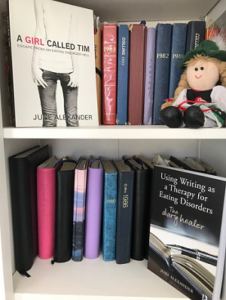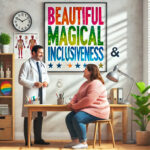Factors to consider when you feel ready to write your story
Factors to consider when you feel ready to write your story

by June Alexander
The writing of a life story or memoir requires preparation and planning, and benefits will come in the process as well as delivery. Choosing the time to write is the first of many factors, for your impression today may differ tomorrow.
This post is especially for people with lived experience of an eating disorder, but you can substitute any major theme in your life – for instance, another major health challenge, or perhaps a meaningful hobby, relationship, or career.
Writing about your experience, and sharing it in a safe and supportive environment, can help overcome the isolation and reduce your fears. For instance, when my therapist recommended several stories to assist in understanding how an eating disorder can sabotage thought patterns, my journey of self-renewal took a leap forward. These stories helped me to accept that the thoughts making my life “hell” were not of my healthy self; they were productions and, in some instances, illusions, generated by the eating disorder (ED). The stories also helped me to understand how to distinguish and separate ED from “me.” They were immeasurably useful in helping me to believe that if others could say “goodbye” to ED, I could too.
Separating ED (or any negative, self-defeating, self-harming thought) from your authentic , healthy-self thoughts is difficult because the negative force seizes any self-doubt to seduce or shame you into thinking you are not good enough. Alternatively, you may feel your story or secret simply cannot be shared because it is your only tool to cope with each day. Either way, the eating disorder or negative thought aims to imprison you.
Stories about others can help you understand this hold the eating disorder or negative thought has on you. Writing your story for yourself can be helpful too. This process alone can help to define and distance you, as a person, from the illness or negative thought. Re-storying your diary entries can assist in stepping back a little and discovering how your life has value and purpose.
You may want to compile a record of events. This can be a helpful step towards correcting misconceptions and misunderstandings. It can also assist in exploring the effect of secrets, and the process of writing can become a release – depending on how your story is shaped, it may inform and educate, and even entertain.
Realizing that you can make your own story, hereon, is empowering. Only you can tell your story, and the mere thought of having this to reflect on, and draw on, as years go by, can be sustaining.
You might want to consider refining your private story, to share with family and close or with the unknown public. However, there are many factors to consider.
Preparing Lessons for Today and Tomorrow
For decades, my diaries reflect a life on hold, while my ED functioned as a helpful and, at times, necessary puppeteer, orchestrating thoughts and behaviors. There was a constant ache of a “hole” within, and a yearning for reintegration of self with body. However, lacking skills and guidance, I was stuck. When I eventually sought and began treatment, a sustaining thought was “when I get through this, I will write my story….”
Being afraid of, and resolute not to tell my story until free of eating disorder symptoms meant that for years the same ED-directed words appeared on my diary pages, over and over again. Such narrative was self-defeating and self-perpetuating rather than disruptive and re-scripting.
Reading and selecting excerpts from these diaries, from childhood to middle age, for my memoir, was very painful. I pined for “me,” but reflecting on the record of suffering also was illuminating, helping me to come to terms with the experience, by confirming two significant factors.
Firstly, indeed, ED did dominate my thoughts and behaviors. Secondly, despite this, through perseverance, my self had been restored and revived. Equally, the anxiety and doubt about what would come next, the fear of letting go of ED, and venturing into hidden parts of me , made the courage to change more meaningful for the person I continue to become.
“December 14, 2005: I am feeling strong … I’ve healed and I don’t need to go “searching” any more … I’m ready for the challenge of writing my book, and through words hope to ease the pain of children suffering eating disorders and feelings of rejection.”
– Author’s diary
Trigger Points and the Restorative Role of Diary-Writing
Babs was well on the road to recovery when she began to read memoirs because:
“I was looking for an answer as to why this illness had happened to me. I took great comfort from realising I was not alone, and particularly, I was not to blame for this terrible thing that had split my family.”
– Babs
During recovery, my work as a journalist sometimes involved interviewing a young author releasing an “inspirational” memoir on eating disorders. I would feel in awe of their gushing account and think “gosh, they have recovered, so there is hope for me too” and then, “gosh, they are getting on with their life in a matter of a year or two, and I’m taking decades. I must be horribly weak.”
However, waiting awhile before going public may be wise, to enable you to become an observer as well as participant in your story, and draw on more perspectives in describing your illness. As Miranda suggests:
“Memoirs can be triggering especially when written too early in recovery, before people have the distance to look back and consider what aspects will help others, and while their ED thoughts are still hard to disentangle from the healthy thoughts.”
– Miranda
Alexandra has mixed emotions about eating disorder memoirs:
“Others’ thoughts and emotions on how they coped with the illness are really helpful and motivating for me. Sometimes, however, memoirs are triggering if they include specific numbers, such as weights or calories, and when people write about a relapse I think this might happen to me, too.”
– Alexandra
Andrea’s perspectives also are ambivalent:
“In my early recovery, certain memoirs were helpful. However, these also sometimes led me to believe I was ‘not sick enough’. This was particularly true of memoirs that detailed behaviours. Also, each person’s experience of eating disorders and recovery differs; no one else’s story is our own, and no story is less valid than another. So, memoirs can be alternatively helpful or damaging.”
– Andrea
Next week I will explore pitfalls that can occur when connecting with the reader.
Further reading:
Using Writing as a Therapy for Eating Disorders—The Diary Healer by June Alexander
A Girl Called Tim (Kindle) by June Alexander (memoir)





